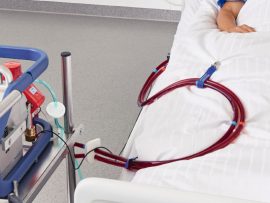Abstract Background: Acute type A aortic dissection (ATAAD) has a high risk of perioperative bleeding and often requires extensive blood product infusions. Analysis of the changes in coagulation and fibrinolysis..
Read MoreAbstract Low cardiac output syndrome and the systemic inflammatory response are consequences of the cardiac surgical perioperative course. The mechanisms responsible are multifactorial, but recent studies have shown that nitric..
Read MoreAbstract Postoperative neurologic complications have a significant effect on morbidity, mortality, and long-term disability in patients undergoing cardiac surgery. The etiology of brain injury in patients undergoing cardiac surgery is..
Read MoreAbstract Cardiopulmonary bypass (CPB) is very commonly performed among the cardiovascular surgeries, and delayed recovery (DR) is a kind of serious complications in patients with CPB. It is necessary to..
Read MoreAbstract Atrial septal aneurysm (ASA) is an uncommon but wellrecognized cardiac abnormality. This educational text reviews the case of a 54-year-old female presenting an ASA related to a small ostium..
Read MoreAbstract Introduction: The use of cardiopulmonary bypass (CPB) leads to increased fluid filtration and edema. The use of artificial colloids to counteract fluid extravasation during cardiac surgery is controversial. Beneficial..
Read MoreAbstract We present a case series of seven patients with suspected cold agglutinin antibodies, discovered after initiation of bypass. Laboratory analysis of blood samples intraoperatively determined the cause of the..
Read MoreAbstract Objective Pediatric surgery for congenital tracheal stenosis continues to be a therapeutic challenge, and it often requires cardiopulmonary bypass (CPB) or extracorporeal membrane oxygenation (ECMO) for intra-operative extracorporeal cardiorespiratory..
Read MoreAbstract The Capiox RX25 and Quadrox‐i Adult oxygenators are commonly used in clinical adult cardiopulmonary bypass circuits. This study was designed to test the effectiveness of two adult oxygenators in..
Read MoreAbstract Mechanically assisted circulation (MAC) sustains the blood circulation in the body of a patients undergoing cardiac surgery with cardiopulmonary bypass (CPB) or on ventricular assistance with a ventricular assist..
Read MoreAbstract Advances in cardiopulmonary bypass equipment have played a critical role in improving outcomes for cardiac surgery patients. Recent advancements include reduced priming volumes, biocompatible coatings and gaseous microemboli handling,..
Read MoreHYPOTHERMIC CIRCULATORY arrest combined with selective cerebral perfusion commonly is employed to permit surgical repair of the ascending and transverse aorta. A variety of perfusion techniques are employed, including retrograde..
Read MoreAbstract Background and objective Acute kidney injury (AKI) following cardiac surgery with cardiopulmonary bypass (CPB) is polyethiological clinical syndrome. During CPB haemodilution develops, which is useful in reducing the risk..
Read MoreAbstract Minimal invasive extracorporeal circulation (MiECC) has initiated important new efforts within science and technology towards a more physiologic perfusion. In this study, we aim to investigate the learning curve..
Read MoreAbstract Acute kidney after cardiac surgery is more common in anaemic patients, whereas haemolysis during cardiopulmonary bypass may lead to iron‐induced renal injury. Hepcidin promotes iron sequestration by macrophages: hepcidin..
Read MoreAbstract OBJECTIVES Prolonged aortic cross-clamp (XCT) and cardiopulmonary bypass time (CPBT) are associated with increased morbidity and mortality following cardiac surgery. The aim of this study was to assess the..
Read MoreAbstract Background (CPB) induces a systemic inflammatory reaction that may contribute to . Preventing this reaction with steroids may improve outcomes. We performed a systematic review to evaluate the impact of..
Read MoreBackground: Glutamine is the most abundant free amino acid in the body. It modulates immune cell function and is an important energy substrate for cells in critically ill patients. Reduction..
Read MoreAbstract Objective As with any biomarker, interpretation of changes of concentration must consider its variability in a specific clinical setting. The aim of this study was to calculate the reference change..
Read More










